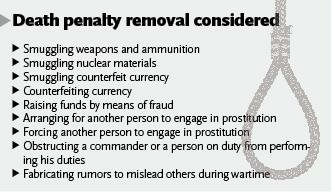HOME >> CHINA
China plans to scrap death penalty for nine crimes
By Catherine Wong Tsoi-lai Source:Global Times Published: 2014-10-28 0:18:01

Graphics: GT
China's top legislature is considering abolishing the death penalty for nine crimes, which is expected to serve as a key advancement in the country's legal system after the Communist Party of China (CPC) laid down the major blueprints for broader legal reform.The proposed move also coincides with the decreasing use of capital punishment worldwide as more than two-thirds of the world's countries have abolished the death penalty in law or practice.
The crimes being reviewed include economic offenses such as counterfeiting currency and raising funds by means of fraud, which have long been crimes that controversially warrant the death penalty. Many scholars have expressed objections to this kind of punishment for these crimes.
The draft amendment to the Criminal Law was submitted on Monday to the Standing Committee of the National People's Congress (NPC) for a first reading during the legislature's bi-monthly session, which runs from Monday to Saturday, the Xinhua News Agency reported. After removing the death penalty for these crimes, those convicted will face a maximum sentence of life imprisonment.
Li Shishi, director of the Legislative Affairs Commission of the NPC Standing Committee, promised that overall punishments for related crimes would not be lessened, and said authorities will strengthen law enforcement so as to ensure the general situation of public security.
The proposed amendment is another move by China to limit the use of the death penalty following a decision at the Third Plenum of the 18th Communist Party of China Central Committee last year to gradually reduce the number of crimes subject to the death penalty.
"This round of proposed amendments is consistent in logic and direction with the last amendments in 2011, which is to focus on crimes that are non-violent or will not cause major harm to public security," said Wang Ping, a legal expert with the China University of Political Science and Law (CUPL).
Wang said he also believes the reduction in death penalty sentences is in accordance with the CPC's pledge to promote judicial credibility at the fourth plenary session of the 18th CPC Central Committee concluded on October 23, as well as coinciding with the increasing number of countries worldwide which have scrapped the death penalty.
Once adopted, it will be the second time that China has reduced the number of crimes punishable by death since the Criminal Law took effect in 1979.
Under the current Criminal Law, the number of crimes punishable by death is 55.
In the last amendment in 2011, China dropped the death penalty for 13 economic non-violent crimes, including smuggling cultural relics, gold and silver and carrying out fraudulent activities related to financial bills.
The need to gradually remove the death penalty for economic crimes has long been agreed upon by legal scholars.
In 2012, the Supreme People's Court overturned a death penalty for Wu Ying, a female billionaire convicted for fraud, after the original verdict triggered uproar among the public.
"Abolition of the death penalty for counterfeiting currency in particular can show significant progress in China's legal system. It was considered a serious crime during the 1950s, but the government has strengthened controls in preventing such offenses," said Qu Xinjiu, dean of the Criminal Justice College at the CUPL.
Capital punishment for corruption crimes was not removed by the draft amendment. Instead, lawmakers are considering imposing harsher punishments on those committing crimes related to embezzlement and bribery.
Both Wang and Qu agree that China will continue to reduce the number of instances of capital punishment in the future, but believe there is unlikely to be a decline in the numbers of capital sentences relating to violent and corruption-related crimes in the near future, as China is in the midst of an anti-terrorism campaign focusing on the Xinjiang Uyghur Autonomous Region and the sweeping nationwide anti-corruption campaign.
In its stipulations against terrorism, the draft added several items to the current law to crack down more heavily on terrorism.
Those promoting terrorism and extremism by producing and distributing related materials, releasing information, instructing in person or through audio, video or information networks, which are common tactics used by terrorists in Xinjiang to spread extremist ideology and practices, will face more than five years in prison in serious cases.
Posted in: Politics